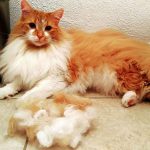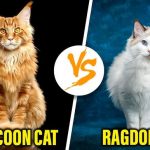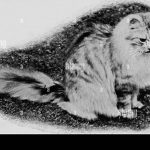What new Diseases are Maine Coon Cats Prone to 2024
Maine Coon cats are prone to hypertrophic cardiomyopathy, hip dysplasia, and spinal muscular atrophy. These hereditary health issues can affect the overall wellbeing of Maine Coon cats.
Hypertrophic cardiomyopathy is a common heart disease in cats, including Maine Coons. Hip dysplasia can cause pain and mobility issues in these cats, while spinal muscular atrophy leads to instability and muscle atrophy in the hind limbs. It is important for owners of Maine Coon cats to be aware of these potential health problems and take appropriate measures to ensure their cats’ well-being.
Regular veterinary check-ups and a healthy lifestyle can help mitigate the risks associated with these diseases.
1. Introduction: Understanding The Health Risks Of Maine Coon Cats
Maine Coonhttps://en.wikipedia.org/wiki/Maine_Coon cats are prone to certain diseases, including hypertrophic cardiomyopathy, hip dysplasia, and spinal muscular atrophy. Hypertrophic cardiomyopathy is the most common heart disease, while spinal muscular atrophy affects the lower spinal cord and hind limb muscles. It’s important to be aware of these health risks when considering a Maine Coon as a pet.
Brief Overview Of Maine Coon Cats And Their Popularity
Maine Coon cats are one of the most beloved and popular cat breeds around the world. Originating from the state of Maine in the United States, these cats are known for their large size, striking appearance, and friendly personalities. They have become a favorite choice for many cat lovers due to their gentle nature, playful attitude, and ability to get along well with other animals and children. Their distinct physical features, such as tufted ears, bushy tails, and beautiful coats, make them stand out among other breeds.
Importance Of Being Aware Of Potential Health Risks For Proper Care
When it comes to taking care of Maine Coonhttps://bengalmeow.com cats, it is crucial to be aware of their potential health risks. While Maine Coons are generally considered a hardy breed, they are prone to certain hereditary health issues that can affect their overall well-being. Being well-informed about these health risks allows cat owners to provide proper care, early detection, and necessary treatments, ensuring a long and healthy life for their beloved pets.
Let’s take a closer look at some of the common health conditions that Maine Coon cats are prone to:
Hypertrophic Cardiomyopathy
Hypertrophic cardiomyopathy (HCM) is the most common form of heart disease in cats and has been diagnosed in Maine Coon cats as well. This condition involves the thickening of the heart muscles, which can lead to poor blood circulation and potentially life-threatening complications if left untreated. Regular veterinary check-ups and screenings are essential to detect and manage this condition early on.
Spinal Muscular Atrophy
Spinal Muscular Atrophy (SMA) is a genetic disease seen in Maine Coon cats. It is characterized by progressive instability, unsteady gait, and posture abnormalities due to the loss of motor neurons in the lower spinal cord and muscle atrophy in the hind limbs. Early diagnosis and supportive therapies can help improve the quality of life for cats affected by SMA.
Hip Dysplasia
Hip dysplasia is a condition that affects the hip joints, causing the socket and femur to not fit together correctly. Maine Coon cats may be prone to this condition due to their large size. It can cause pain, difficulty in movement, and arthritis. Regular exercise, a balanced diet, and medication can help manage this condition and alleviate discomfort.
By staying informed about these potential health risks, Maine Coon cat owners can take proactive steps to ensure their pets’ well-being. Regular veterinary check-ups, a balanced diet, regular exercise, and a loving environment can go a long way in promoting a healthy and fulfilling life for these majestic cats.
2. Hypertrophic Cardiomyopathy (hcm): A Common Heart Disease In Maine Coons
Maine Coon cats are known for their majestic appearance and gentle nature. However, it is crucial for owners to be aware of the potential health issues that they are prone to. One of the most common health concerns in Maine Coons is hypertrophic cardiomyopathy (HCM), a form of heart disease that affects cats. Understanding the prevalence of HCM in Maine Coons, as well as the symptoms, diagnosis, and treatment options, is essential for ensuring the wellbeing of these beloved felines.
Explanation Of Hypertrophic Cardiomyopathy And Its Prevalence In Cats
Hypertrophic cardiomyopathy is a heart disease characterized by the thickening of the heart muscle, which hampers the heart’s ability to pump blood effectively. This condition is the most common form of heart disease in cats, and unfortunately, Maine Coons have a higher risk of developing HCM compared to other breeds. The exact cause of HCM in Maine Coons is not fully understood, but it is believed to have a genetic basis.
The Specific Risk Of Hcm For Maine Coon Cats
Maine Coons are genetically predisposed to developing hypertrophic cardiomyopathy, making it a significant health concern for this breed. Studies have shown that approximately one-third of Maine Coon cats carry a gene mutation related to HCM, which increases the risk of developing the condition. As a responsible owner, it is crucial to be proactive in monitoring your Maine Coon for any signs or symptoms of HCM.
Symptoms, Diagnosis, And Treatment Options For Hcm In Maine Coons
Recognizing the symptoms of hypertrophic cardiomyopathy in Maine Coons is essential for early detection and treatment. Some common signs include difficulty breathing, coughing, lethargy, and sudden collapse. If you notice any of these symptoms in your Maine Coon, it is crucial to seek veterinary attention promptly. The veterinarian will perform a thorough physical examination, including listening to your cat’s heart and may recommend additional diagnostic tests such as echocardiography or electrocardiography to confirm the diagnosis.
Once diagnosed with HCM, the treatment approach for Maine Coons will focus on managing the symptoms and maintaining their overall heart health. This may involve medications to help regulate heart function, special diets low in sodium to reduce fluid retention, and regular monitoring to assess the progression of the disease. It’s important to follow your veterinarian’s recommendations closely to ensure the best quality of life for your Maine Coon.
Hypertrophic cardiomyopathy is a significant health concern for Maine Coon cats due to their genetic predisposition to this heart disease. Understanding the prevalence, symptoms, diagnosis, and treatment options can help owners detect and manage HCM early, ensuring the best possible care for their beloved furry companions.
3. Spinal Muscular Atrophy (sma): Genetic Disease Affecting Maine Coons
Maine Coon cats are known for their large size, friendly nature, and overall good health. However, like any breed, they are prone to certain genetic diseases. One such disease is Spinal Muscular Atrophy (SMA). In this section, we will explore the definition and explanation of SMA, its genetic nature in Maine Coon cats, the signs and symptoms, as well as available tests and potential treatment options.
Definition And Explanation Of Spinal Muscular Atrophy
Spinal Muscular Atrophy (SMA) is a genetic disease that affects the motor neurons in the spinal cord, leading to muscle weakness and atrophy. It is caused by a mutation in the survival motor neuron 1 (SMN1) gene.
The Genetic Nature Of Sma In Maine Coon Cats
SMA in Maine Coon cats is inherited as an autosomal recessive trait. This means that both parents must carry the defective gene for their offspring to develop the disease. Cats with only one copy of the mutated gene are carriers and do not show any symptoms of SMA.
Signs And Symptoms Of Sma In Maine Coons And Its Impact On Mobility
SMA can manifest in various ways in Maine Coon cats. The most common signs and symptoms include:
- Progressive instability and unsteady gait
- Posture abnormalities
- Muscle weakness and atrophy, especially in the hind limbs
Due to these symptoms, mobility can be greatly affected. Jumping, climbing, and running may become challenging for cats with SMA.
Available Tests And Potential Treatment Options For Sma In Maine Coons
Early detection of SMA is crucial for managing the disease and improving the quality of life for affected cats. Genetic testing is available to identify if a Maine Coon carries the SMN1 mutation. Breeders can use this information to make informed breeding decisions and reduce the risk of passing on the disease to future generations.
Unfortunately, there is currently no cure for SMA in Maine Coon cats. However, there are supportive treatments available to manage the symptoms and slow down disease progression. These treatments may include physical therapy, assistive devices, and medications to alleviate muscle weakness and improve mobility.
In summary, Spinal Muscular Atrophy (SMA) is a genetic disease that affects Maine Coon cats. It is inherited as an autosomal recessive trait and can have a significant impact on the cat’s mobility. Early detection through genetic testing is crucial for proper management. While there is no cure for SMA, supportive treatments can improve the cat’s quality of life. If you have a Maine Coon or are considering getting one, it is important to be aware of this genetic disease and work closely with your veterinarian to ensure the best possible care for your furry friend.

Credit: phys.org
4. Hip Dysplasia: Joint Abnormality That Can Affect Maine Coon Cats
Maine Coon cats are known for their large size and sturdy build. However, like any other breed, they can still be prone to certain health conditions. One such condition that can affect Maine Coon cats is hip dysplasia, which is a joint abnormality that can cause pain and mobility issues. Understanding this condition is essential for Maine Coon cat owners to ensure their furry friends live a comfortable and healthy life.
Understanding The Concept Of Hip Dysplasia In Cats
Hip dysplasia is a condition that affects the hip joint, causing improper development and functioning. In cats, it is often accompanied by joint laxity, which means the hip joint is loose and unstable. This can lead to pain, inflammation, and difficulty in movement. Hip dysplasia is typically a hereditary condition, but it can also be influenced by environmental factors such as rapid growth or injury.
Prevalence And Risk Factors Of Hip Dysplasia In Maine Coon Cats
While hip dysplasia can potentially affect any cat breed, it appears to be more prevalent in Maine Coon cats compared to others. This might be attributed to their large size and the genetics associated with the breed. If one or both of the parents of a Maine Coon cat have hip dysplasia, there is an increased risk of the offspring also developing the condition. Additionally, certain factors like obesity, lack of exercise, and poor nutrition can contribute to the onset and severity of hip dysplasia.
Recognizing The Symptoms And Signs Of Hip Dysplasia In Maine Coons
Identifying the signs of hip dysplasia in Maine Coon cats is crucial for early detection and intervention. Keep an eye out for the following symptoms:
- Lameness or limping, especially in the hind legs
- Difficulty in getting up or lying down
- Reluctance to jump or climb stairs
- Decreased activity or exercise intolerance
- Pain or sensitivity when the hip area is touched
Management And Treatment Options For Hip Dysplasia In Maine Coon Cats
Although hip dysplasia cannot be completely cured, there are management and treatment options available to alleviate the symptoms and improve the quality of life for Maine Coon cats. These may include:
- Weight management to reduce stress on the joints
- Regular exercise tailored to the cat’s condition
- Supplements like glucosamine and chondroitin to promote joint health
- Pain medication prescribed by a veterinarian
- Physical therapy and rehabilitation exercises
In severe cases, surgery may be considered as a last resort.
5. Other Health Risks And Considerations For Maine Coon Cats
Maine Coon cats are prone to various health risks and diseases such as hypertrophic cardiomyopathy, hip dysplasia, and spinal muscular atrophy. These issues are common in the breed and should be carefully considered when taking care of a Maine Coon cat.
Brief Overview Of Additional Health Risks That Maine Coon Cats May Be Prone To
Maine Coon cats, known for their large size and friendly nature, are generally quite healthy. However, there are a few health risks and considerations that owners should be aware of. While they are generally considered a hardy breed, Maine Coon cats are prone to certain hereditary health issues. These include hypertrophic cardiomyopathy, hip dysplasia, spinal muscular atrophy, stomatitis, and polycystic kidney disease. It’s important to note that not all Maine Coon cats will develop these conditions, but they may have a higher risk compared to other breeds.
Discussing The Importance Of Regular Veterinary Check-ups And Preventive Care
Regular veterinary check-ups are crucial in maintaining the overall health and well-being of Maine Coon cats. Veterinary professionals are trained to detect early signs of diseases and can provide appropriate treatments or preventive measures. During these check-ups, the veterinarian may recommend vaccinations, deworming, flea and tick prevention, and dental care. By following these recommendations and staying proactive about preventive care, owners can help ensure their Maine Coon cats stay healthy and comfortable for many years to come.
Tips For Maintaining The Overall Health And Well-being Of Maine Coon Cats
Taking care of a Maine Coon cat involves a few extra considerations to keep them in optimal health. Here are some tips to maintain their overall well-being:
1. Provide a balanced diet: Maine Coon cats have a hearty appetite, so it’s crucial to feed them a balanced diet that meets their nutritional needs. Consult with your veterinarian to determine the right type and amount of food for your cat’s age, weight, and activity level.
2. Regular exercise: While Maine Coon cats are generally less active compared to other breeds, they still require regular exercise to prevent obesity and maintain muscle tone. Engage them in interactive play sessions, provide scratching posts or climbing trees, and encourage them to chase toys.
3. Grooming: Maine Coon cats have a long and dense coat that requires regular grooming. Brush their fur at least once a week to prevent matting and hairballs. Regular grooming also allows you to check for any skin issues or abnormalities.
4. Maintain dental hygiene: Dental problems are common in cats, including Maine Coons. Brush their teeth regularly using a cat-friendly toothbrush and toothpaste recommended by your veterinarian. Additionally, provide dental treats or toys that help promote oral health.
5. Environmental enrichment: Maine Coon cats are known for their intelligence and curiosity. Provide them with stimulating toys, scratching posts, and interactive playtime to prevent boredom and keep them mentally stimulated.
In conclusion, while Maine Coon cats are generally healthy, they may be prone to certain hereditary health issues. Regular veterinary check-ups, preventive care, and following these tips for maintaining their overall well-being are essential in providing a happy and healthy life for your Maine Coon cat.
Frequently Asked Questions On What Diseases Are Maine Coon Cats Prone To
Are Maine Coons Prone To Any Diseases?
Maine Coons are prone to diseases such as hypertrophic cardiomyopathy, hip dysplasia, and spinal muscular atrophy.
What Is The Life Expectancy Of Maine Coon Cats?
The life expectancy of Maine Coon cats typically ranges from 12 to 15 years. These cats are generally healthy and hardy, but they may be prone to certain health issues such as hypertrophic cardiomyopathy, hip dysplasia, and spinal muscular atrophy.
What Is The Neurological Disorder In Maine Coon Cats?
Maine Coon cats can develop a neurological disorder called Spinal Muscular Atrophy (SMA). This genetic disease causes unstable movements and posture abnormalities due to the loss of motor neurons in the spinal cord.
Conclusion
Maine Coon cats are prone to several diseases, including hypertrophic cardiomyopathy, hip dysplasia, and spinal muscular atrophy. Hypertrophic cardiomyopathy is a common heart disease among cats, and it has been known to affect Maine Coons. Spinal muscular atrophy is a genetic disease that causes instability and posture abnormalities in these cats.
While Maine Coon cats are generally considered a hardy breed, it is important for owners to be aware of these potential health issues and provide appropriate care and monitoring to ensure their cats’ well-being.




